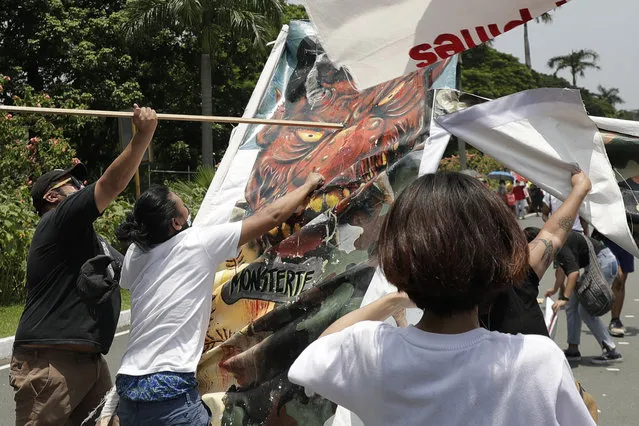
Protesters hit a caricature of Philippine President Rodrigo Duterte as they hold a rally in time for his State of the Nation Address on Monday, July 27, 2020 in Manila, Philippines. Hundreds of protesters marched, staged motorcades and held a rally against a new anti-terror law and other issues Monday in the Philippine capital despite police threats of arrests ahead of the president’s annual state of the nation speech. (Photo by Aaron Favila/AP Photo)
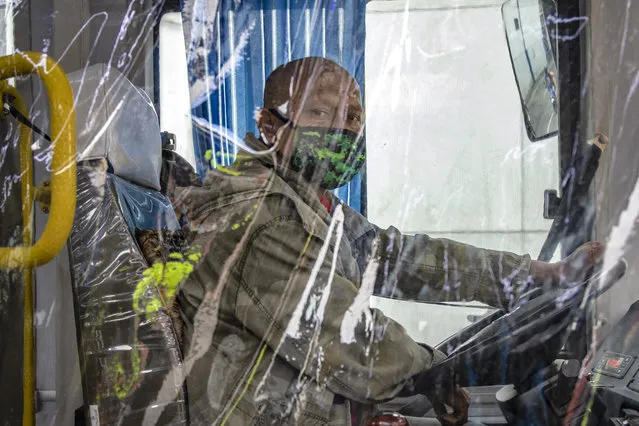
A driver sits behind a plastic covering for protection inside a bus on the first day of relaxed quarantine measures on June 1, 2020 in Quezon city, Metro Manila, Philippines. The sign reads “Please help, we are jeepney drivers. Our families are hungry”. The Philippines on Monday eased one of the world's longest and strictest lockdowns in the world to curb the spread of the coronavirus, even as cases of the virus in the country continue to rise. The 80-day lockdown in parts of the country has left millions of Filipinos jobless and hungry, and even as free mass testing for COVID-19 remains absent in most parts of the country, there has been a spike in reported cases in the past week. The Philippines' Department of Health has so far reported 18,086 cases of the coronavirus in the country, with at least 957 recorded fatalities. (Photo by Ezra Acayan/Getty Images)
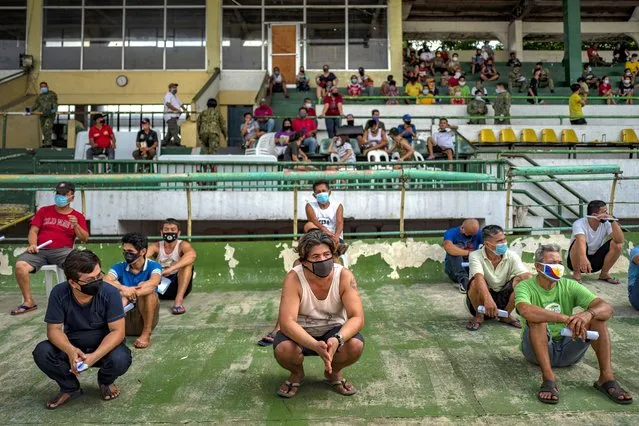
People arrested for not wearing face masks are detained at a stadium on July 8, 2020 in Quezon city, Metro Manila, Philippines. President Rodrigo Duterte expressed concern with reopening the country as it struggles to contain the spread of the coronavirus. With more than 45,000 cases and more than a thousand deaths, the Philippines is the second worst coronavirus-hit country in Southeast Asia, despite imposing the longest lockdown in the world surpassing a hundred days that has left millions of Filipinos jobless and hungry. (Photo by Ezra Acayan/Getty Images)
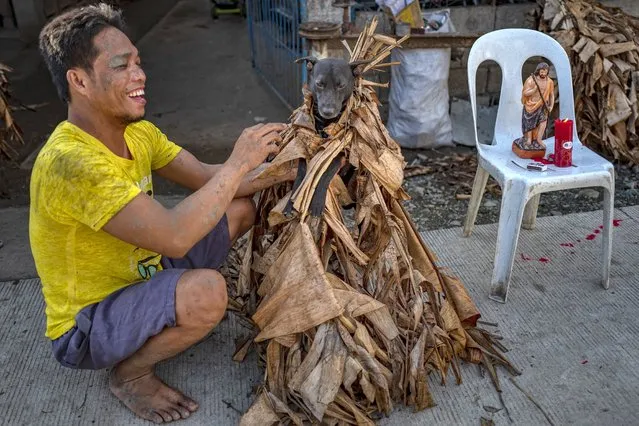
A devotee covers a dog in mud and dried banana leaves to celebrate the Taong Putik (“mud people”) Festival on June 24, 2020 in the village of Bibiclat in Aliaga town, Nueva Ecija province, Philippines. Each year, the residents of Bibiclat village in Aliaga town celebrate the Feast of Saint John by covering themselves in mud, dried banana leaves, vines, and twigs as part of a little-known Catholic festival which traces its history from the Pacific War and reenacts how rain stopped the execution of 14 villagers by Japanese soldiers in 1944. The townsfolk considered this as a miracle from Saint John, and every year since then the villagers roll in mud to show their gratitude to the saint. Due to the coronavirus pandemic, religious gatherings remain banned as part of government lockdown measures, and devotees have been advised to celebrate in their homes. With more than 30,000 cases and more than a thousand deaths, the Philippines is one of the worst coronavirus-hit countries in Southeast Asia, despite imposing the longest lockdown in the world surpassing 100 days. (Photo by Ezra Acayan/Getty Images)
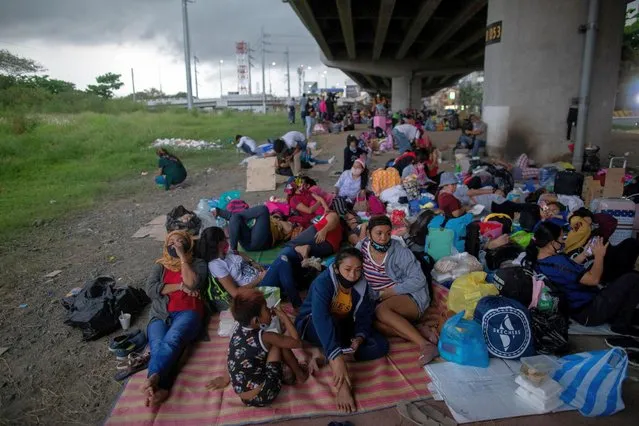
Stranded passengers, mostly Overseas Filipino Workers (OFW) with cancelled flights due to the coronavirus disease (COVID-19) outbreak, take shelter under the NAIA Expressway, outside the Ninoy Aquino International Airport in Pasay City, Metro Manila, Philippines on June 11, 2020. (Photo by Eloisa Lopez/Reuters)
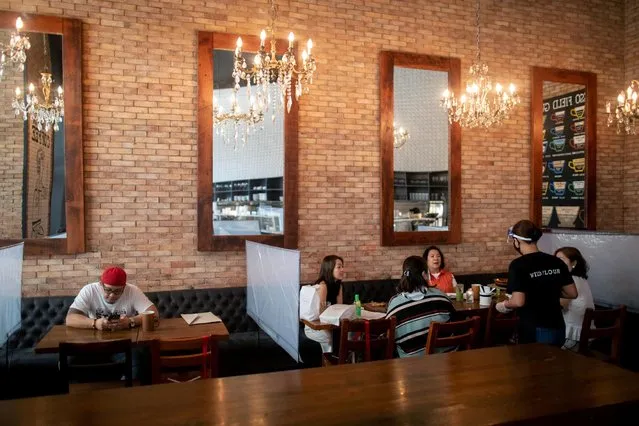
Customers eat at a restaurant where plastic barriers are installed between tables as the Philippine government allows dining-in following months of restrictions in Mandaluyong City, Metro Manila, Philippines, June 16, 2020. (Photo by Eloisa Lopez/Reuters)
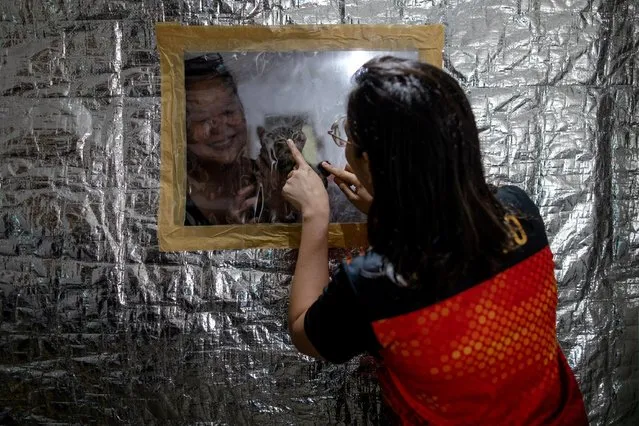
Jan Claire Dorado, 30, a doctor assigned to the coronavirus disease (COVID-19) Emergency Room of East Avenue Medical Center, bonds with her mother and cat from behind the small plastic window on her makeshift isolation room to protect her family from potential exposure to the coronavirus disease (COVID-19), in Quezon City, Metro Manila, Philippines, June 26, 2020. (Photo by Eloisa Lopez/Reuters)
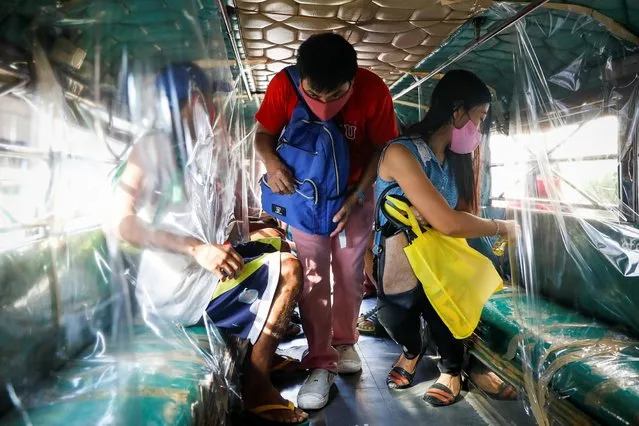
A passenger wearing a mask for protection against the coronavirus disease (COVID-19) boards the jeepney, while another sprays disinfectant on her seat, in Quezon City, Metro Manila, Philippines, July 3, 2020. (Photo by Eloisa Lopez/Reuters)
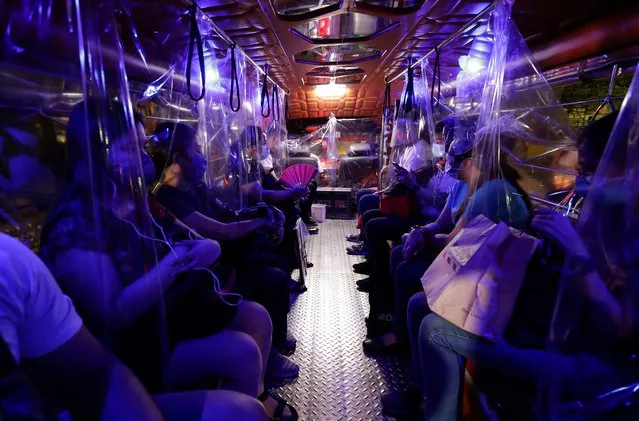
Plastic sheets on a traditional Jeepney bus separate passengers as part of health measures to help prevent the spread of the new coronavirus in metropolitan Manila, Philippines on Friday, July 3, 2020. The government is allowing some routes for Jeepneys to be opened to help public transportation as the government slowly eases the coronavirus lockdown. (Photo by Aaron Favila/AP Photo)
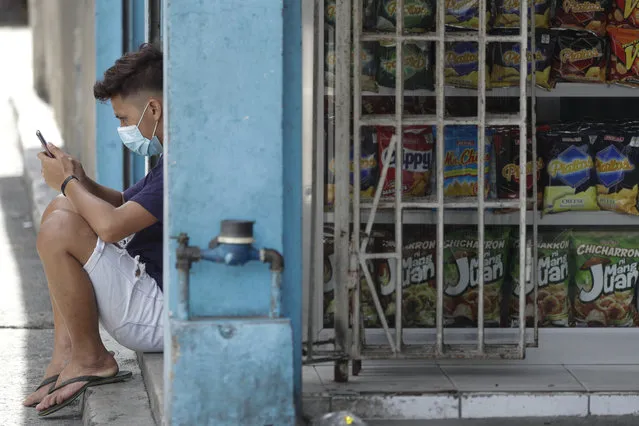
A man wearing a mask uses his smartphone outside a store in Manila, Philippines on Monday, August 3, 2020. Philippine President Rodrigo Duterte is reimposing a moderate lockdown in the capital and outlying provinces after medical groups appealed for the move as coronavirus infections surge alarmingly. (Photo by Aaron Favila/AP Photo)

A worker of the Philippine Postal Office sprays disinfectants on mails and parcels that will be delivered inside the PhilPost Office in Manila, the Philippines, on June 10, 2020. The number of coronavirus cases in the Philippines rose to 22,992 after the Department of Health reported 518 more infections on Tuesday. (Photo by Rouelle Umali/Xinhua News Agency via Getty Images)
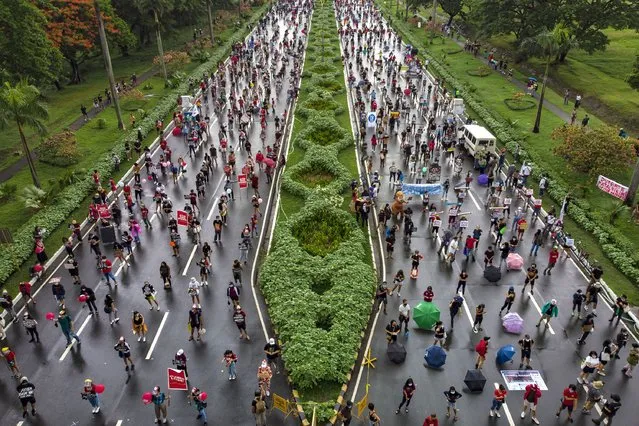
An aerial view shows Filipinos observing social distancing as they take part in a protest against President Duterte's Anti-Terror bill on June 12, 2020 in Quezon city, Metro Manila, Philippines. Activists marked Independence Day on Friday by staging protests against a new anti-terrorism law expected to be signed by President Rodrigo Duterte, amid threats by police that they could be arrested for violating coronavirus quarantine rules against mass gatherings. The controversial new law, which critics say is even more draconian than China's new security law for Hong Kong, can be used to quell public dissent and could lead to more human rights abuses by the state. The United Nations published a new report saying that human rights abuses in the Philippines have worsened under Duterte, with police and vigilantes encouraged to use lethal force in the country's war on drugs, which rights groups estimate has killed more than 30,000 people. (Photo by Ezra Acayan/Getty Images)
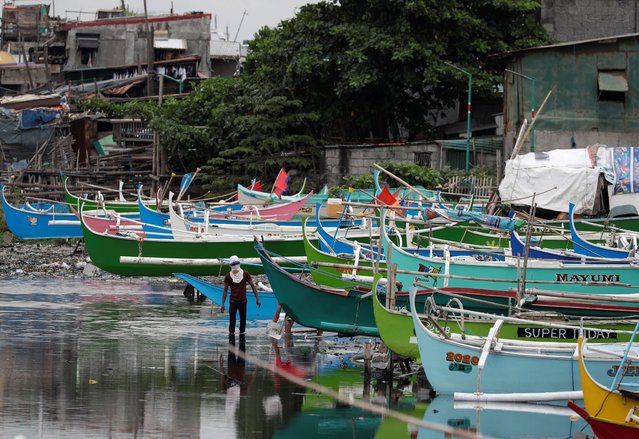
A man walks by docked fishing boats during the start of a lockdown due to a rise in COVID cases in the city of Navotas, Manila, Philippines on Thursday, July 16, 2020. Coronavirus infections continue to rise in the country after reopening the economy that is on the brink of a recession while still struggling to combat the pandemic. (Photo by Aaron Favila/AP Photo)
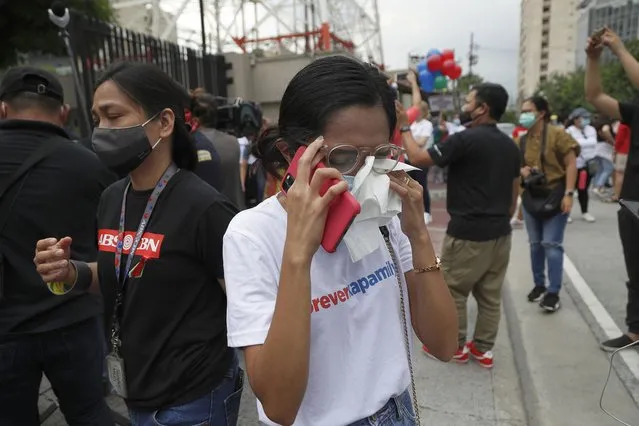
A supporter wipes her tears after hearing the results of the voting at the House of Representative for the franchise renewal of ABS-CBN at the company headquarters of ABS-CBN in Quezon City, Philippines, Friday, July 10, 2020. Philippine lawmakers voted Friday to reject the license renewal of the country's largest TV network, shutting down a major news provider that had been repeatedly threatened by the president over its critical coverage. (Photo by Aaron Favila/AP Photo)
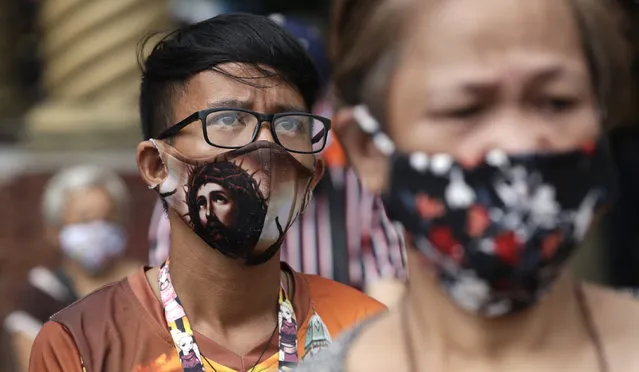
A devotee wearing a protective mask bearing the face of Jesus Christ waits outside the Minor Basilica of the Black Nazarene, popularly known as Quiapo church, as it slowly reopens its doors in downtown Manila, Philippines on Friday, June 5, 2020. President Rodrigo Duterte has expressed relief that “Filipinos are really law-abiding” and that the Philippines was not going through riots like America which would make coronavirus quarantine enforcement formidable. (Photo by Aaron Favila/AP Photo)
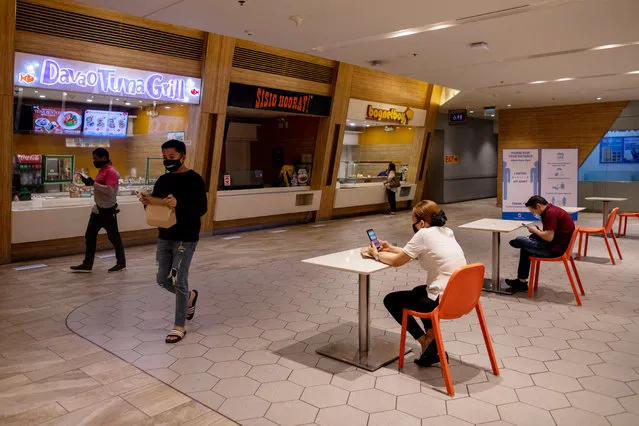
Diners wait for their orders at a food court where only one customer per table is allowed, as the Philippine government allows dining-in following months of restrictions due to the coronavirus disease (COVID-19) outbreak, in Mandaluyong City, Metro Manila, Philippines, June 16, 2020. (Photo by Eloisa Lopez/Reuters)
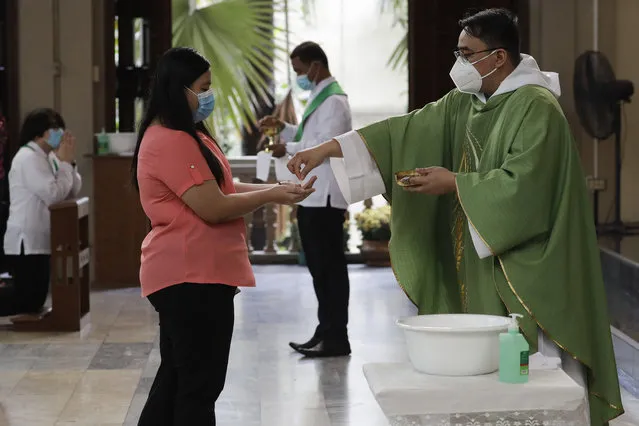
Catholic priest Fr. Ian Espartero distributes communion during Mass to only a few parishioners as a measure to prevent the spread of COVID19 at the Our Lady of Consolation Parish on Sunday, August 2, 2020, in Quezon city, Philippines. Coronavirus infections in the Philippines continues to surge Sunday as medical groups declared the country was waging a losing battle against the contagion and asked the president to reimpose a lockdown in the capital. (Photo by Aaron Favila/AP Photo)
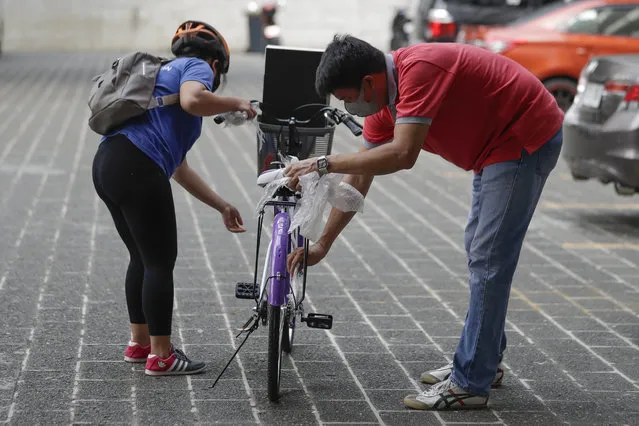
A recipient, left, of a bicycle from the Benjamin Canlas Courage to be Kind Foundation prepares to ride outside a building at the financial district of Manila, Philippines, Saturday, July 11, 2020. Restricted public transportation during the lockdown left many Filipinos walking for hours just to reach their jobs. The foundation saw the need and gave away mountain bikes to nominated individuals who are struggling to hold on to their jobs in a country hard hit by the coronavirus. (Photo by Aaron Favila/AP Photo)
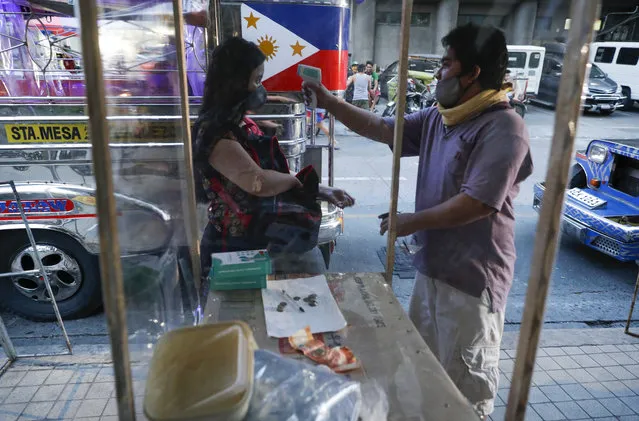
In this July 3, 2020, file photo, a passenger has her temperature checked to prevent the spread of the new coronavirus as some routes for the Traditional Jeepney buses were opened to help public transportation while the government slowly eases lockdown in metropolitan Manila, Philippines. The Philippines has seen a big recent spike in infections, raising the possibility its overcrowded capital may be placed back under a strict lockdown. (Photo by Aaron Favila/AP Photo/File)
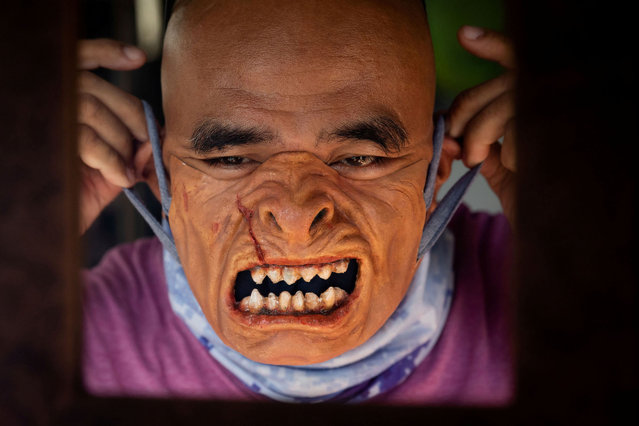
TV prosthetics artist Rene Abelardo tries on a sample of his prosthetic face mask, his latest creation as TV projects took a halt amid the coronavirus disease (COVID-19) outbreak, in San Pedro, Laguna, Philippines, June 17, 2020. (Photo by Eloisa Lopez/Reuters)
31 Aug 2020 00:03:00,
post received
0 comments
